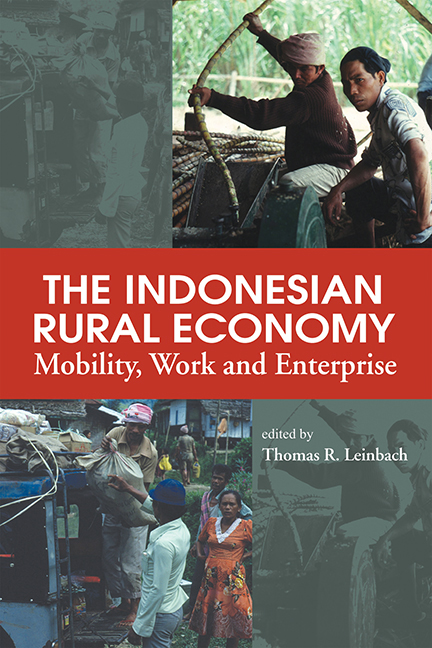Book contents
- Frontmatter
- Content
- List of Tables
- List of Figures
- Contributors
- Acknowledgements
- Glossary
- Foreword
- Part I The Development Context
- Part II Entrepreneurship, Gender and Mobility Issues
- Chapter 5 International Labour Migration and Rural Dynamics: A Study of Flores, East Nusa Tenggara
- Chapter 6 Gender, Socio-Spatial Networks, and Rural Non-Farm Work Among Migrants in West Java
- Chapter 7 Micro and Small-Scale Enterprises in Java: A Gender-Based Comparative Analysis of Entrepreneurial Behaviour and Performance of Enterprises
- Chapter 8 Migrant Entrepreneurs in East Indonesia
- Part III Indonesia's Rural Non-Farm Economy: Case Studies and Policy Development
- Index
Chapter 5 - International Labour Migration and Rural Dynamics: A Study of Flores, East Nusa Tenggara
from Part II - Entrepreneurship, Gender and Mobility Issues
Published online by Cambridge University Press: 21 October 2015
- Frontmatter
- Content
- List of Tables
- List of Figures
- Contributors
- Acknowledgements
- Glossary
- Foreword
- Part I The Development Context
- Part II Entrepreneurship, Gender and Mobility Issues
- Chapter 5 International Labour Migration and Rural Dynamics: A Study of Flores, East Nusa Tenggara
- Chapter 6 Gender, Socio-Spatial Networks, and Rural Non-Farm Work Among Migrants in West Java
- Chapter 7 Micro and Small-Scale Enterprises in Java: A Gender-Based Comparative Analysis of Entrepreneurial Behaviour and Performance of Enterprises
- Chapter 8 Migrant Entrepreneurs in East Indonesia
- Part III Indonesia's Rural Non-Farm Economy: Case Studies and Policy Development
- Index
Summary
Introduction
Although international labour migration is occurring on a large scale in Indonesia with substantially more than a million workers officially deployed overseas and at least that number illegally working in other nations, its impact on the overall economy in a country of almost 200 million people, while not insignificant, is limited. However, the effects of this movement are strongly spatially concentrated within particular regions and communities, especially rural communities, from which labour migrants are disproportionately recruited. In such regions the impacts are substantial. In a context where increasing attention is being paid by policy makers in less developed economies to widening interregional inequalities and the need to supplement sectoral economic development strategies with regional development initiatives, such spatially focused economic impacts are of particular significance. In the meagre body of literature relating to economic effects of labour migration upon origin countries in Asia however, the bulk of analysis has been conducted at the national and individual levels of analysis while regional and community effects have been neglected.
The present paper seeks to summarize and evaluate evidence from a limited number of rural communities in the province of East Nusatenggara (NTT) in Eastern Indonesia, which have experienced significant outmigration of workers who are employed overseas on a legal, and especially illegal, basis. The regional and local economic impacts considered relate both to the ‘passive’ impacts of the loss of human capital on the local economy, which the emigration represents as well as the more ‘active’ effects of the injection of remittances into the local economy. It is found that when such a regional or community level of analysis is adopted the effects of this emigration are seen to be considerable. This is especially the case in areas which have limited local development potential or resources and which are lagging economically. Indeed, such areas are disproportionately represented among the origin areas of overseas contract workers (OCWs). There is a clear recognition of this not only within the communities affected but also among local regional officials and planners. However, nationally formulated development policies, programmes and strategies often not only do not take account of these effects but also in some cases hamper the full potential benefits to be realised.
- Type
- Chapter
- Information
- The Indonesian Rural EconomyMobility, Work and Enterprise, pp. 103 - 133Publisher: ISEAS–Yusof Ishak InstitutePrint publication year: 2003

